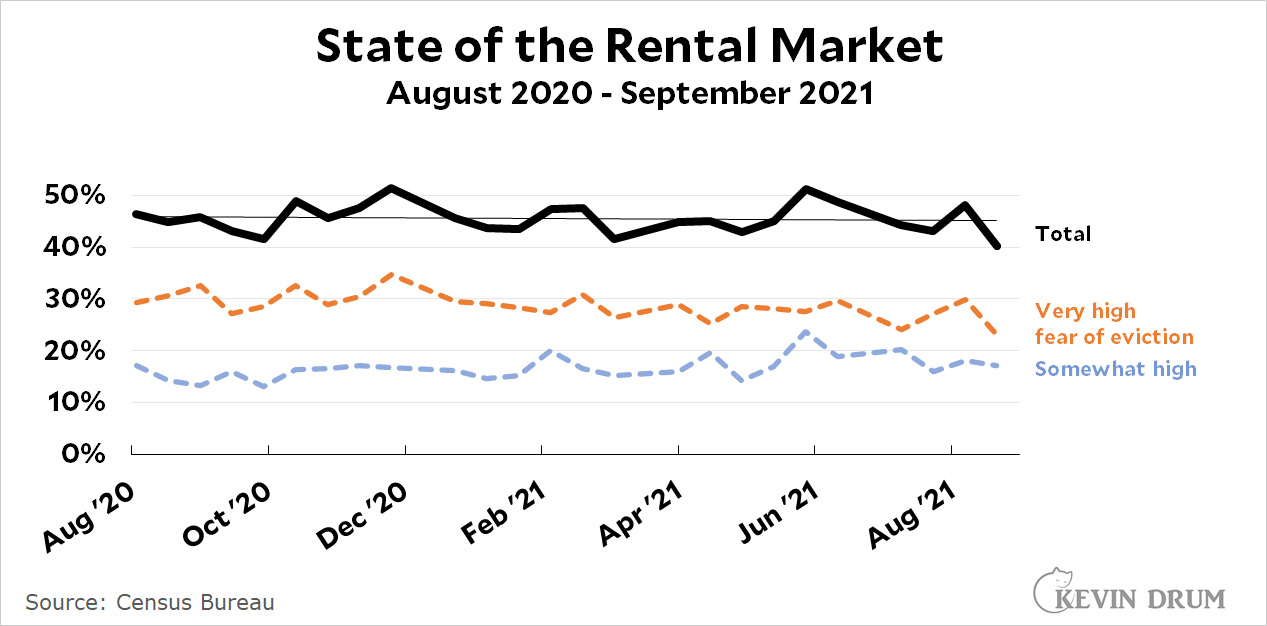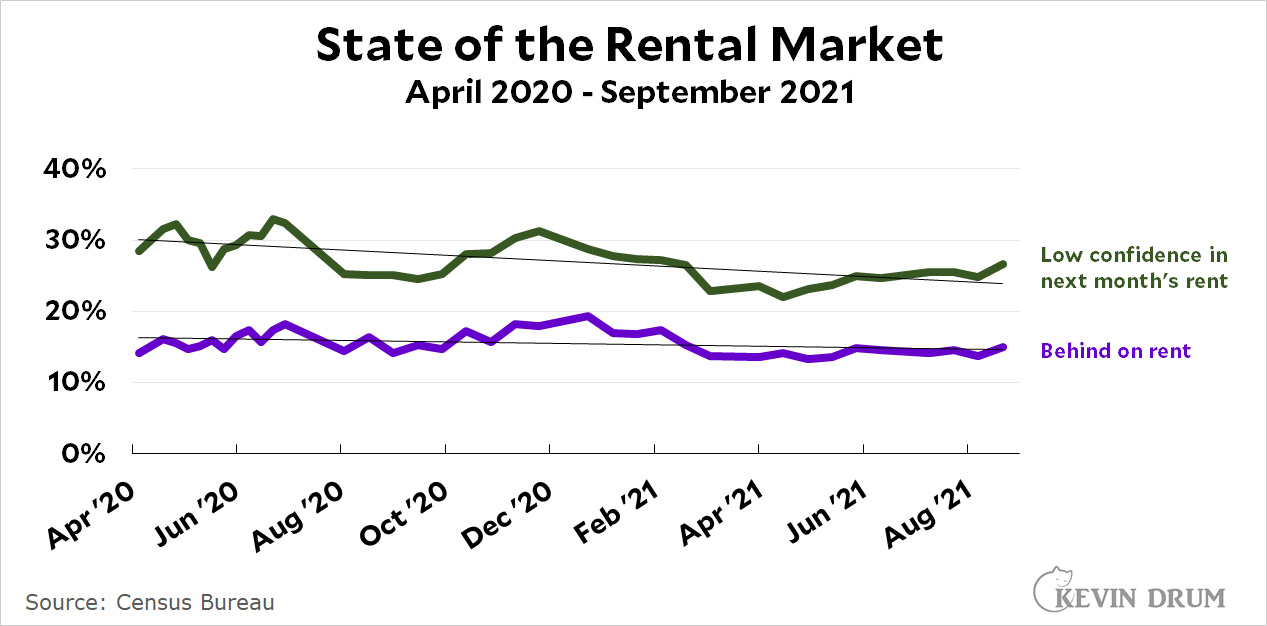In news that comes as a shock to everyone who hasn't actually been paying attention, evictions haven't skyrocketed since the eviction moratorium ended last month:
In major metropolitan areas, the number of eviction filings has dropped or remained flat since the Supreme Court struck down the Centers for Disease Control and Prevention moratorium on Aug. 26, according to experts and data collected by the Eviction Lab at Princeton University. In cities around the country, including Cleveland, Memphis, Charleston and Indianapolis, eviction filings are well below their pre-pandemic levels.
....The overall picture has confused experts who had grim warnings for the looming crisis once the federal ban was no longer in place. Those same experts are hesitant to say the wave won’t come. After all, recent Pulse Survey data by the Census Bureau suggests that some 3 million households have reported concerns of imminent eviction.
Yes, the Household Pulse survey suggests that about 3 million families fear that they may be evicted in the next couple of months. However, this is a pretty worthless statistic. First, it includes only families that are renting homes, not apartments. Second, it's based on the number of people surveyed, which changes from week to week. Third, what we want to know is not the raw number anyway, but whether it's going up or down as a percentage of all home renters. Here's the answer:

I wouldn't take this very seriously, but just for the record it shows that fear of eviction has been pretty stable for the past year and actually dipped a bit at the end of September.
Here's a better set of data from the survey:

This includes all renters and goes back further than the eviction question. It shows that trouble making rent has trended generally downward, but with a small blip upward at the end of September. Is that meaningful? It's too early to say. The next release of the Household Pulse survey will give us our first true look at things in the weeks following the end of the rent moratorium.
In any case, there's no mystery here. The reason that evictions aren't skyrocketing is because the rescue packages passed by Congress kept poor people whole during the pandemic and even allowed them to save a little. Those benefits have now ended, but people are mostly as current on their rent as usual and are now back to where they started before the recession. There's really no special reason why they should be any farther behind on rent than they've ever been.
It's striking to me that this isn't more widely recognized. The big pandemic rescue packages were a victory for liberals, and we should be celebrating the fact that they allowed low-income workers to survive the pandemic recession mostly intact. The rent figures are pretty good evidence that we did the right thing.

What we really need is attitudes before mid-2020, especially before the big job losses. It is very odd that the measures did not go down much as unemployment decreased after April - is this measure even very sensitive to things like unemployment? Do we know would cause it to vary? You need to know that before drawing any conclusions.
It was poor hype. Based on unreality. At least confirm what is going on.
Yeah, I'm kind of sick of the "look at point B" without any point A to compare it to.
Unskewed evictions.... amusing how ideologues respond to data.
My guess: Property owners -- "landlords," if you will -- don't nesessarily want to throw renters out and start over with new tenants, if they can even find new tenants able to pay the current high rents, and that's not to mention the cleaning and prep to put a property back on the rental market. With Democrats in control, property owners might be expecting some kind of government assistance and so are willing to wait. For a while, anyway.
This completely ignores that there are still state-level eviction moratoria in place, or only recently ended.
It also elides complete ignorance of the fact that evictions take several weeks if not months to complete on the administrative side before the sheriff even shows up at the door.
Also, if this is only looking at renters of SFHs and not apartments... why are we even talking about it? Not that those folks aren't important, but they're a minority of renters.
All good points. Maybe Kevin will revisit the issue in 3 months or so?
Nope, not good points. There are few state wide mandates left. You need taken by your nostril and educated.
"First, it includes only families that are renting homes, not apartments."
I don't want to be a pedant, but apartments ARE homes. Do you mean to say "single-family detached dwellings"?
If it doesn't have an American flag flying and a Porche parked out front, it ain't a home.
👍👍👍👍
Lolol
I just wish Dems would flaunt these sort of numbers to show their success. They seem always to hold back on their successes and allow the repubs to demean them in very way possible.
No, it was Cori Bush in a sleeping bag on the Capitol Steps for 24 hours activating the will of the lower- & lower-middle classes to secure their homes. No different than Tom Brady activating the will of his defense to win games when TBHGH can only muster 14 points all game & throws for 3 interceptions.
Yes, the eviction moratorium and the expanded UI benefits did what it was supposed to. Unlike the bailouts after the '07 crunch, people could stay in their homes AND landlords of various sizes could keep their properties AND the financial sector got paid. A lot of people abhor the idea of government action that benefits anyone but a narrow group of wealthy people, but this bailout was ooze-up, not trickle-down, and ooze-up works. We'll probably be reading a lot about how the eviction moratorium wasn't needed and that the expanded UI benefits hurt that nation's moral character, but I'm guessing a lot more people will be recognizing that ooze-up policy works, unlike trickle-down.
Because it just would not do to call out constituencies as Chickens Little? Or perhaps as manufactured crisis opportunists?
Rather it's likely something more like short attention spans of Journos, general innumeracy leading to anectdote seeking rather than data, and the fact Activitists never believe they are wrong and the subject matter Activists were the ones beating the drum.
Post hoc ergo promoter hoc.
It’s never enough.
The Pulse Survey is a recent, experimental tool, designed specifically to track a series of effects during the pandemic, but its effective baselines (April 2020 and Phase I -- Apr-Jul 2020) make it impossible to measure effects before and after the pandemic. Nonetheless, it does offer the ability to track effects between the start of the pandemic, and KD's inference from the poorly laid out charts and the WaPo writeup can be seen when digging directly into the data, here: https://www.census.gov/data-tools/demo/hhp/#/?measures=HINSEC&periodSelector=37&areaSelector=std
It's clear that over time, housing insecurity has gone down quite a lot, but also it becomes a lot more volatile at the granular level. To my sensibility, this is exactly why the updated eviction ban targeting states that were experiencing widespread infections made sense.
Context is useful, if unpopular:
"...current data suggest there was roughly 1 eviction filing for every 17 renter households between 2000 and 2016. Approximately 1 in 40 renter households were evicted over this period. To put these numbers into perspective, at the peak of the financial crisis in 2010, estimates suggest slightly over one million foreclosures were completed nationally. By comparison, we see almost a million evictions against tenants every single year. The narrative on housing often focuses on displacement among homeowners, but our findings suggest that there is an ongoing epidemic of eviction and displacement in the renting market."
In other words, there has been a wave of evictions going on long before the Pandemic. Reflecting higher housing prices and a natural desire on the part of landlords to maximize profits.
If the support provided last year helped a lot and now the economy is strong, then we don’t need more support. We don’t need the Presidents build back better programs. I’m sure they are all nice things, but life for most will be fine if none of them are implemented because life is fine for most now.
Democrats need to win some more elections to get it done. And it doesn’t really seem like that’s going to happen. So that means the status quo is acceptable to enough people such that change is not possible.
Make your peace with it.
Before making such grand statements let's remember that the President's agenda is not restricted to evictions.
As I remember the sounds we heard from the landlord's side strongly suggested that they had humongous numbers of evictions teed up. If this turns out to be a bluff so much the better.